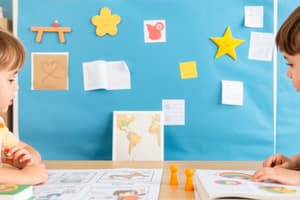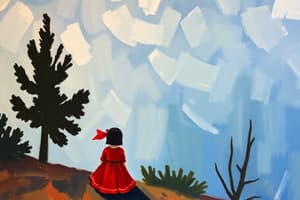Podcast
Questions and Answers
What is one primary theme of the examination planning processes in Early Childhood education?
What is one primary theme of the examination planning processes in Early Childhood education?
- Developing technology skills in children
- Assessment based on standardized testing
- Theoretical and philosophical approaches to curriculum (correct)
- Focusing solely on teacher-directed learning
Which of the following approaches emphasizes respect for children's voices?
Which of the following approaches emphasizes respect for children's voices?
- Reggio Emilia (correct)
- Direct Instruction
- Traditional Learning
- Behaviorist Approach
What is a key characteristic of child-centered learning approaches?
What is a key characteristic of child-centered learning approaches?
- Emphasis on rote memorization
- Teacher-led instruction at all times
- Exclusive focus on academic achievement
- Learner's interests and needs drive the curriculum (correct)
Which of the following best describes the term 'Emergent Curriculum'?
Which of the following best describes the term 'Emergent Curriculum'?
In the context of early childhood planning, what does ‘holistic assessment’ refer to?
In the context of early childhood planning, what does ‘holistic assessment’ refer to?
Which role is emphasized in the Reggio Emilia approach regarding teachers?
Which role is emphasized in the Reggio Emilia approach regarding teachers?
What is an essential element of reflective practice in early childhood education?
What is an essential element of reflective practice in early childhood education?
What is one function of documentation in early childhood education?
What is one function of documentation in early childhood education?
Which of the following principles is central to the Montessori approach?
Which of the following principles is central to the Montessori approach?
What is a key focus of Anti-Bias Curriculum?
What is a key focus of Anti-Bias Curriculum?
Which strategy is NOT a characteristic of Steiner education?
Which strategy is NOT a characteristic of Steiner education?
What differentiates an effective play-based approach from a laissez-faire one?
What differentiates an effective play-based approach from a laissez-faire one?
Which aspect of inquiry-based learning is emphasized in Kathy Walker's approach?
Which aspect of inquiry-based learning is emphasized in Kathy Walker's approach?
What principle underscores the interaction between teachers and students in Steiner education?
What principle underscores the interaction between teachers and students in Steiner education?
In which aspect does the Montessori method emphasize responsibility?
In which aspect does the Montessori method emphasize responsibility?
What type of learning environment does the Anti-Bias Curriculum aim to foster?
What type of learning environment does the Anti-Bias Curriculum aim to foster?
What is one of the primary purposes of reflective practice for educators?
What is one of the primary purposes of reflective practice for educators?
Which type of reflection involves analyzing actions after they have occurred?
Which type of reflection involves analyzing actions after they have occurred?
How does reflective practice contribute to improving outcomes for children?
How does reflective practice contribute to improving outcomes for children?
At which level should reflection ideally take place according to the mentioned practices?
At which level should reflection ideally take place according to the mentioned practices?
What aspect of reflective practice is crucial for engaging with families?
What aspect of reflective practice is crucial for engaging with families?
What is the main purpose of wall stories in documenting children's learning?
What is the main purpose of wall stories in documenting children's learning?
How do classroom diaries benefit children and families?
How do classroom diaries benefit children and families?
What role do floor books play in the learning process?
What role do floor books play in the learning process?
Which of the following is considered a product of children's learning documentation?
Which of the following is considered a product of children's learning documentation?
What is NOT a characteristic of wall stories?
What is NOT a characteristic of wall stories?
Which of the following best describes the purpose of work samples in learning documentation?
Which of the following best describes the purpose of work samples in learning documentation?
Which method emphasizes recording children's ideas on topics of interest?
Which method emphasizes recording children's ideas on topics of interest?
What is the primary focus of capturing significant learning in classroom diaries?
What is the primary focus of capturing significant learning in classroom diaries?
Flashcards are hidden until you start studying
Study Notes
Exam Overview
- The exam is worth 30% of the final grade.
- There will be 4 extended answer questions, each worth approximately 2 pages.
- The exam will focus on four main themes:
- Planning processes and considerations in Early Childhood.
- Theoretical/philosophical approaches to curriculum.
- Child-led pedagogies and associated documentation.
- Reflection and evaluation.
Question 1
- Planning in early childhood education involves considering policy directives at the system, school, and classroom levels.
- The Australian Curriculum and SCASA are relevant frameworks for planning.
- Important considerations for planning include:
- Observation and assessment.
- Holistic approaches to assessment.
Question 2
- The exam requires knowledge of two curriculum approaches.
- Reggio Emilia emphasizes:
- Child-centered learning.
- Emergent curriculum.
- Project-based learning.
- Collaborative learning.
- Documentation.
- Teachers as co-learners.
- Multiple forms of expression (the "100 languages of the child").
- The environment as the "third teacher."
- Reggio-inspired materials.
- Respect for children's voices.
- Parent and community involvement.
- Reflection and professional development.
- Holistic development.
- The image of the child.
- Anti-Bias Curriculum focuses on:
- Awareness of bias.
- Inclusive and diverse representation.
- Critical thinking.
- Empathy and perspective-taking.
- Identity exploration.
- Social justice education.
- Culturally responsive teaching.
- Positive role models.
- Montessori emphasizes:
- Child-centered learning.
- A prepared environment.
- Freedom and responsibility.
- Mixed-age groups.
- Individualized learning.
- Hands-on learning.
- Self-directed learning.
- Respect for the child.
- Observation and documentation.
- Parent involvement.
- The role of the teacher.
- Steiner emphasizes:
- Education for the whole child.
- Age-appropriate learning.
- Artistic expression.
- Emphasis on imagination and creativity.
- No early academics.
- Non-competitive environment.
- Integrated learning.
- Strong teacher-student relationships.
- Ethical and social development.
- A connection to nature.
- Parental involvement.
- Inquiry/Project Approach is highlighted as a relevant curriculum approach.
- Kathy Walker Learning is an adaptation of the inquiry/project approach developed in Australia.
- Play-based Approach emphasizes:
- Intentional, child-centered, and initiated learning.
- Open-ended play experiences.
- Scaffolding and value-adding by the educator.
Question 3
- The exam requires knowledge of strategies for recording, assessing, and reporting on pedagogical documentation.
- Processes for recording children's learning:
- Wall stories.
- Classroom diaries.
- Floor books.
- Products for recording children's learning:
- Portfolios.
- Work samples.
- Reports.
- Wall stories provide opportunities for:
- Children, families, and the school community to see documented learning.
- Children to contribute to the display.
- The inclusion of photographs that connect to curriculum and developmental outcomes.
- Classroom diaries offer opportunities to:
- Show and represent children's learning.
- Encourage reflection on learning by families and children.
- Capture significant learning from incidental experiences.
- Floor books are a way to:
- Record children's voices and ideas on topics of interest.
- Intentional guide planning in response to children's interests.
- Record the learning process for families.
Question 4
- The exam requires knowledge of the importance and process of reflection.
- Why is reflection important? It helps educators to:
- Respond thoughtfully and with integrity to complex situations and challenges.
- Make careful and well-informed decisions and plans.
- Implement and evaluate changes in their practices and policies.
- Be accountable to families, colleagues, and communities.
- Improve learning experiences and outcomes for children.
- Reflection should occur at all levels:
- School/center.
- Classroom.
- Self.
- Types of reflection:
- Reflection IN action focuses on immediate observations and adjustments during the act of teaching.
- Reflection ON action involves looking back at a lesson or experience and analyzing what happened.
- Reflection FOR action focuses on planning for future actions based on reflection.
- Reflection within the teaching cycle involves analyzing information, documenting learning, assessing progress, and planning future curriculum approaches.
Studying That Suits You
Use AI to generate personalized quizzes and flashcards to suit your learning preferences.




